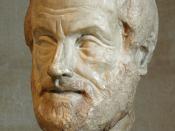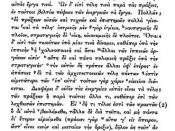Aristotle on Happiness
Happiness has different meanings to different people. The rich believe prosperity is the ultimate stage of happiness, the materialistic person thinks it is the amount of possessions, the ruler thinks it is political power, and the artist may think it his fame that makes him happy. Some people even believe there is no such thing as happiness. Almost everyone tries to reach the goal of happiness but not many succeed. The richest people, as well as the most famous artists and the most powerful rulers, still have unhappiness in their lives. We only have to watch television to see that there is a problem. The media shows us every day the unhappiness of the famous. The reason might be that they look in the wrong directions seeking it.
In his "Nicomachean Ethics", Aristotle analyzes the problem and tries to show us what happiness really is. Aristotle thinks happiness really exists and persists through life.
For him happiness is the goal of goals, the true end of all of our actions. He argues that people are confused about the real meaning of happiness because many think it is a feeling. Aristotle has different thoughts about it; he believes that happiness is not an emotion since it takes action to reach the goal of goals. Emotions are a temporary state and happiness is something that persists, so it cannot be a feeling. In order to show us that happiness does not come from wealth, power, or fame, he establishes four test questions. He argues that most people do not pass these questions. According to Aristotle happiness is something that we cannot lose easily, is appropriate to human beings, and is complete. It must be something choice worthy that is done by us, and not just something that is done...


